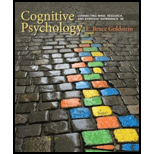
Introduction
The ability of an individual to recreate and represent the sensory world in their mind in the absence of external stimuli is known as mental imagery. This representation can be in the form of taste, smell, image, sound, or tactical sensation, and is experienced by individuals on a daily basis.
Explanation of Solution
Answer and explanation
The term “imagery” refers to the mental representation of one's surroundings in the absence of environmental stimuli. The use of this term dates back to the times of Aristotle, who believed that thoughts cannot occur without an image. Even the father of experimental psychology, Wilhelm Wundt, considered imagery to be one of the three elements of consciousness.
This phenomenon of forming mental representations of one's environment occurs on a daily basis. An artist visualizing a client's face to paint it, an interior designer picturing the furniture that would look good in a room, and a composer imagining the next note in a song are examples of mental imagery. While auditory and visual imagery are the most commonly experienced, people often imagine tastes, smells, and tactile sensations as well.
Want to see more full solutions like this?
- Match the term with the short description. Prompts Answers Recitative A composition or movement inserted between parts of a longer composition Aria A speech-like style of singing Overture A short instrumental introduction to a larger work Interlude A song for solo voice with orchestra that showcases vocal virtuosityarrow_forwardThe composer/conductor who double orchestra musicians’ salaries and treated them with respect was: a) Joseph Haydn b) Felix Mendelssohn c) Ludwig van Beethoven d) Richard Wagnerarrow_forwardMatch the term with its short description. Prompts Answers Concerto The full orchestra or a large group of musicians contrasted with a smaller one Concerto grosso Composition for several instrumental soloists and small orchestra; usually in three movements Fugue A polyphonic composition based on one main theme or subject treated in counterpoint Tutti Extended composition for instrumental soloist and orchestra; usually in three movementsarrow_forward
- Match the term with the short description. Prompts Answers Coda Is section displaying technical virtuosity that is played or improvised by the soloist without orchestral accompaniment Exposition A concluding section that rounds off a movement by extending the tonic chord Cadenza The first section of a sonata form Pedal A single tone, often in the bass, that is held while other voices produce changing harmonies against itarrow_forwardThe first examples of polyphony are believed to be originated between 700-900 C.E. - when French nobles composed love songs for court festivities - in Northern Italy - when musicians composed new songs to accompany dances - in the Notre Dame cathedral in Parisarrow_forwardDuring the Renaissance, it was common practice for noble families to bring their musicians along when traveling from one castle to another. a) True b) Falsearrow_forward
- In the Middle Ages _____ were the center of learning and music making. - crusades - castles - schools - churchesarrow_forwardWhat sentences best describe the troubadours of the Middle Ages? (Mark all that apply) - Performed music and acrobatics in castles, taverns, and town squares - Composed songs on love and honor - Belong to the lowest social classes - Distributed news and gossip from town to townarrow_forwardSelect all the predominant types of composition in the Renaissance period: (Mark all that apply) - the mass - motets - madrigals - symphoniesarrow_forward
- Select items that make a cantata and an opera different. - use of scenery and costumes - acting - length of the composition - use of vocal soloistsarrow_forwardDuring the Renaissance period, many musicians found employment in: a) Churches b) Schools c) Royal Courts d) Regional orchestrasarrow_forward_________ ‘s piano style was characterized by a poetic use of the pedal, singing melodies, and the use of rubato. a) Robert Schumann b) Franz Liszt c) Frédéric Chopin d) Johannes Brahmsarrow_forward
 Ciccarelli: Psychology_5 (5th Edition)PsychologyISBN:9780134477961Author:Saundra K. Ciccarelli, J. Noland WhitePublisher:PEARSON
Ciccarelli: Psychology_5 (5th Edition)PsychologyISBN:9780134477961Author:Saundra K. Ciccarelli, J. Noland WhitePublisher:PEARSON Cognitive PsychologyPsychologyISBN:9781337408271Author:Goldstein, E. Bruce.Publisher:Cengage Learning,
Cognitive PsychologyPsychologyISBN:9781337408271Author:Goldstein, E. Bruce.Publisher:Cengage Learning, Introduction to Psychology: Gateways to Mind and ...PsychologyISBN:9781337565691Author:Dennis Coon, John O. Mitterer, Tanya S. MartiniPublisher:Cengage Learning
Introduction to Psychology: Gateways to Mind and ...PsychologyISBN:9781337565691Author:Dennis Coon, John O. Mitterer, Tanya S. MartiniPublisher:Cengage Learning Psychology in Your Life (Second Edition)PsychologyISBN:9780393265156Author:Sarah Grison, Michael GazzanigaPublisher:W. W. Norton & Company
Psychology in Your Life (Second Edition)PsychologyISBN:9780393265156Author:Sarah Grison, Michael GazzanigaPublisher:W. W. Norton & Company Cognitive Psychology: Connecting Mind, Research a...PsychologyISBN:9781285763880Author:E. Bruce GoldsteinPublisher:Cengage Learning
Cognitive Psychology: Connecting Mind, Research a...PsychologyISBN:9781285763880Author:E. Bruce GoldsteinPublisher:Cengage Learning Theories of Personality (MindTap Course List)PsychologyISBN:9781305652958Author:Duane P. Schultz, Sydney Ellen SchultzPublisher:Cengage Learning
Theories of Personality (MindTap Course List)PsychologyISBN:9781305652958Author:Duane P. Schultz, Sydney Ellen SchultzPublisher:Cengage Learning





